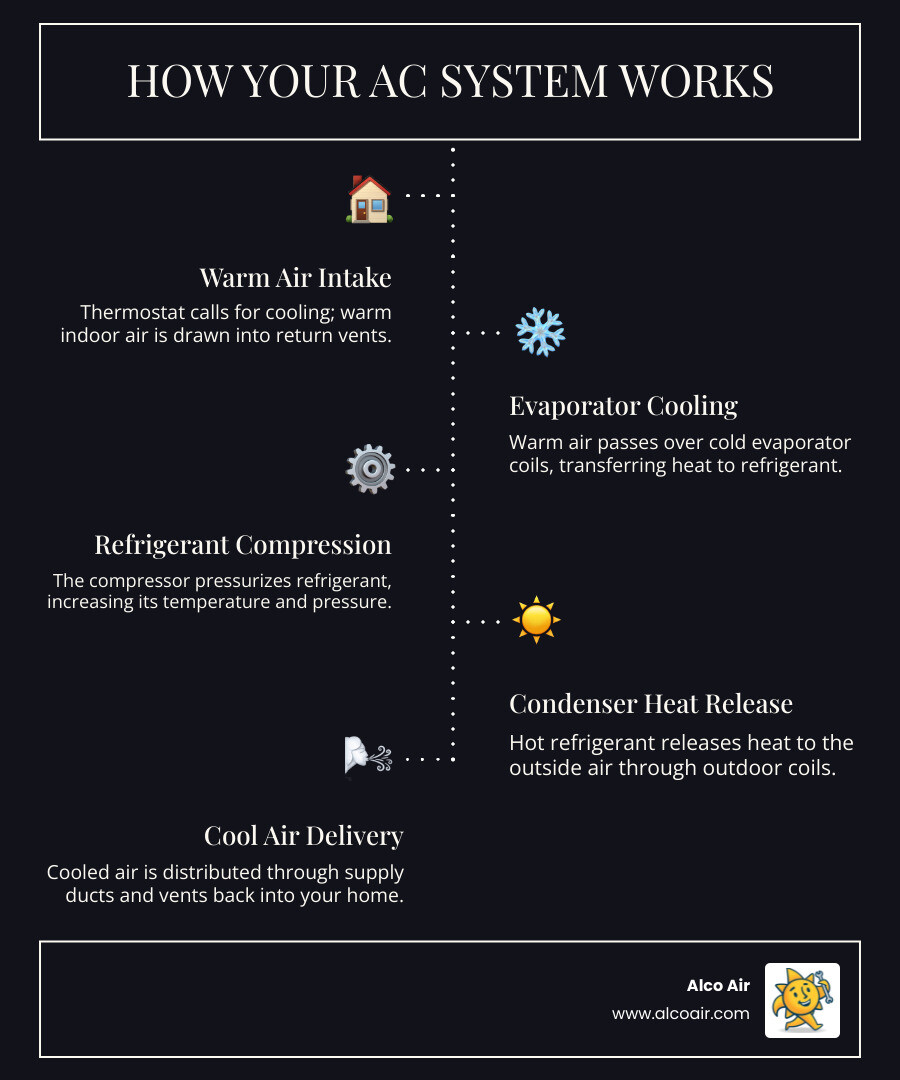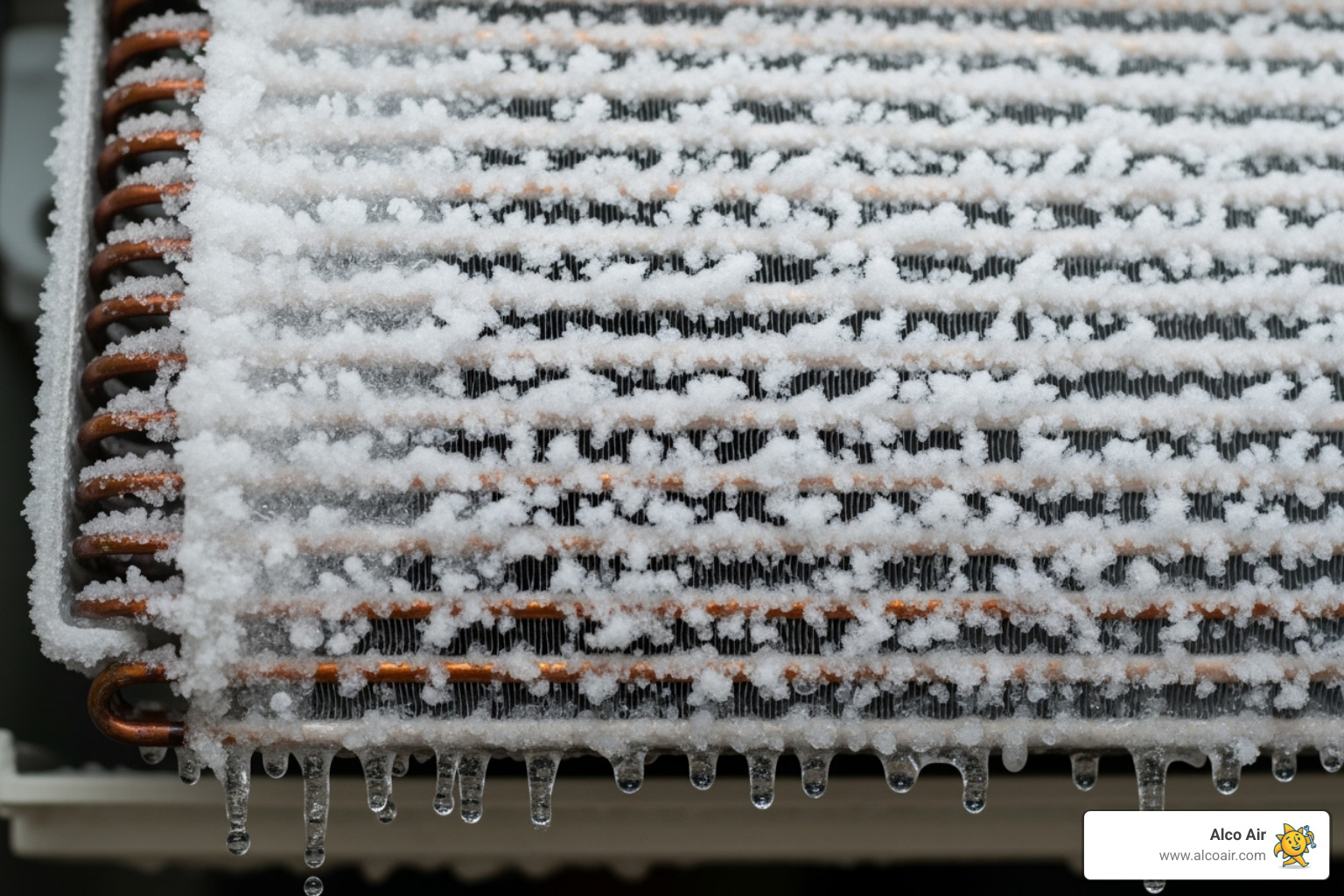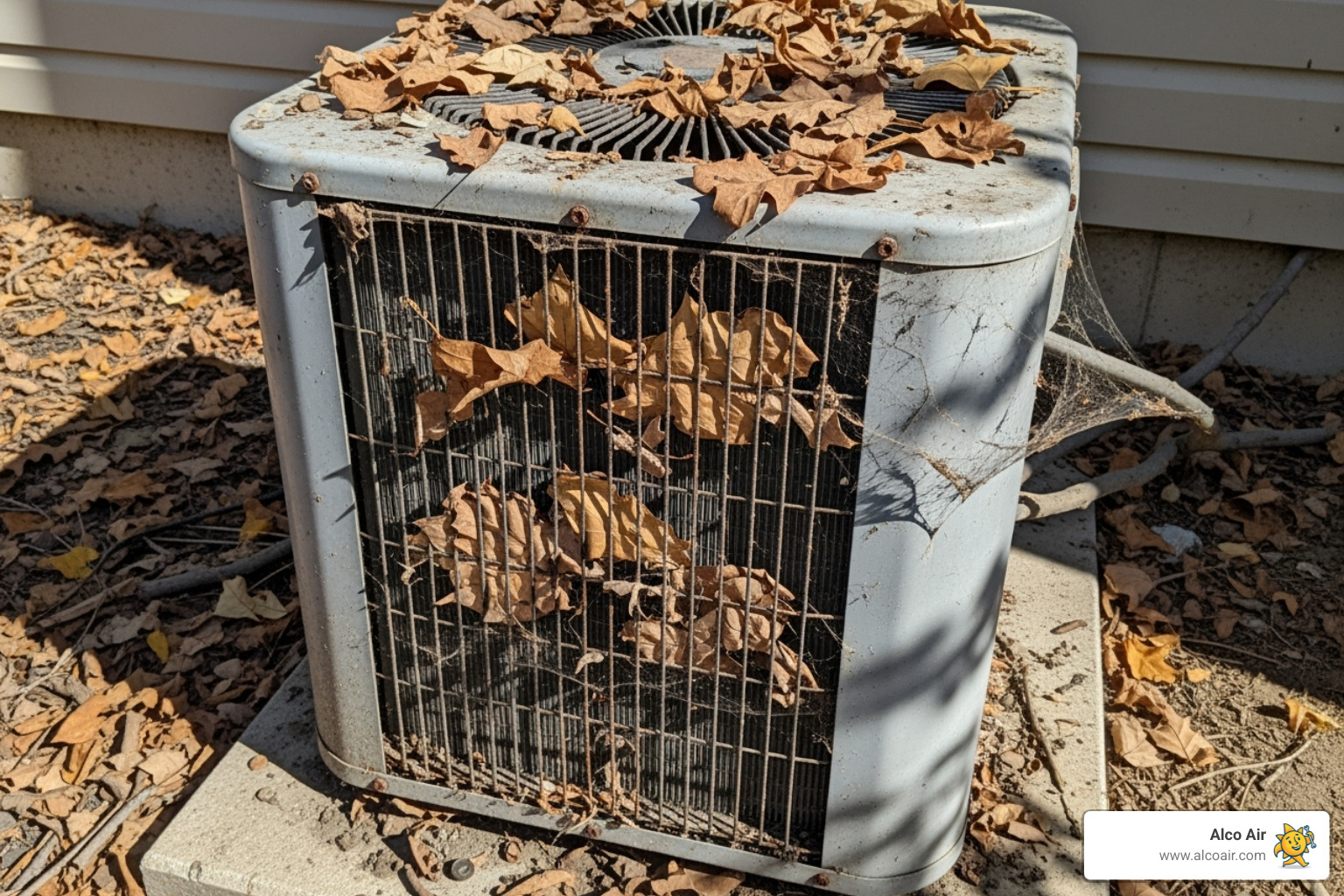Why Your AC Blowing Hot Air Isn’t Just Annoying—It’s Urgent
Nothing spoils a hot Texas day like an AC blowing warm air. This is one of the most frustrating problems homeowners face, especially during Longview’s brutal summers. AC blowing hot air is a common issue that can signal anything from a simple fix to a serious system failure.
Quick Answer: Common Causes of AC Blowing Hot Air
- Thermostat issues – Wrong setting or dead batteries
- Dirty air filter – Blocks airflow and strains system
- Refrigerant leak – Low coolant prevents heat absorption
- Frozen evaporator coils – Ice blocks proper cooling
- Dirty outdoor unit – Can’t release heat effectively
- Faulty compressor – Heart of system isn’t working
- Electrical problems – Power issues or blown fuses
Your air conditioner cools your home by pulling warm air over cold evaporator coils filled with refrigerant. When any part of this cycle breaks down—from a clogged filter to compressor failure—you’ll feel warm air instead of cool comfort.
Some fixes are simple DIY tasks, while others require professional expertise. Knowing the difference can save you time and prevent the problem from getting worse.
First, Try These Simple DIY Checks
Before calling for service, try these simple checks. Many cases of AC blowing hot air have easy solutions you can handle yourself, saving time and money.
Check Your Thermostat Settings
It might sound simple, but incorrect thermostat settings cause many service calls. First, ensure your thermostat is set to “COOL” mode, not “HEAT” or “FAN.” The “FAN” setting only circulates room-temperature air.
Next, set the temperature lower than the current room temperature to signal the AC to turn on. Also, set the fan to “AUTO,” so it only runs during the cooling cycle. When set to “ON,” the fan blows continuously, even when the system isn’t cooling.
If your thermostat is battery-powered, check the batteries; a dim or blank display means they likely need replacing. For smart thermostats, verify that an energy-saving schedule isn’t overriding your settings.
Inspect Your Air Vents and Filters
Your AC needs clear airflow to work. Walk through your home and ensure no furniture, curtains, or other items are blocking supply or return vents. It’s important to keep all your vents open, even in unused rooms, to maintain proper system balance.
Now, check the most common culprit for AC blowing hot air: the air filter. If you can’t see light through it, it’s clogged and needs to be replaced. A clogged filter restricts airflow, strains your system, and can cause it to overheat or freeze. Change your filter every 1-3 months—more often if you have pets. Regular filter changes are one of the most effective AC Maintenance Tips you can follow.
Reset the Circuit Breaker
Your AC may have tripped a circuit breaker, especially during a heatwave. Go to your electrical panel and find the breaker for your HVAC system. If it’s in the middle or OFF position, flip it completely OFF, then firmly back to ON.
After resetting, wait 15-20 minutes for your system to start blowing cool air.
Important warning: If the breaker trips repeatedly or feels hot, do not reset it again. This indicates a serious electrical problem requiring immediate professional help. For more guidance, see our HVAC Troubleshooting guide.
If these checks don’t solve the problem, it’s time to look at more complex issues.
Top 7 Reasons Your AC is Blowing Hot Air
If the simple DIY checks didn’t solve your problem, it’s time to consider more complex issues. These common mechanical and electrical failures often require a closer look by a qualified technician.
1. Low or Leaking Refrigerant
Refrigerant, sometimes called “Freon,” is the chemical that allows your AC to cool the air. It works in a sealed system, so low refrigerant means you have a leak somewhere. Leaks are serious, as they prevent proper cooling and can release chemicals that are harmful to the environment.
Signs of a refrigerant leak include:
- Hissing or bubbling sounds from your AC units.
- Reduced cooling power as the system struggles.
- Ice formation on refrigerant lines or the outdoor unit.
- Oily residue around AC components and connections.
- Higher energy bills from the system working overtime.
Refrigerant issues require a professional to safely handle the chemicals and use specialized equipment to find and repair the leak. Learn more about the Signs Your Air Conditioner Needs Repair.
2. Frozen Evaporator Coils
When your indoor evaporator coils get too cold, they can freeze over, forming a layer of ice that blocks heat absorption. This insulation effect is a common reason your AC is blowing hot air.
The two main causes are:
- Restricted airflow: A clogged air filter or blocked vents prevent warm air from reaching the coils, causing them to get too cold and freeze.
- Low refrigerant: A leak can cause a pressure drop that makes the coils excessively cold.
You’ll know you have frozen coils if you see visible ice on the coils or refrigerant lines, notice musty smells, or find puddles of water from melting ice near your indoor unit.
If you suspect frozen coils, turn off your AC immediately but set the fan to “ON” to help circulate air and thaw the ice. This can take several hours. After it thaws, replace the air filter. If it freezes again, you likely have a refrigerant leak that needs professional service. Find out more about AC Freezing Issues in Longview Homes.
3. Dirty Outdoor Condenser Unit
Your outdoor condenser unit releases the heat absorbed from inside your home. If it’s covered in dirt, leaves, and grass clippings, it can’t transfer heat effectively. This forces your entire system to work harder, leading to an AC blowing hot air, higher energy bills, and potential compressor damage.
Cleaning your outdoor unit is a simple DIY task. First, turn off the power at the circuit breaker. Clear away any leaves, weeds, and debris, ensuring there is at least two feet of clearance around the unit for proper airflow.
Then, use a gentle spray from your garden hose to rinse the fins, spraying from the inside out if possible. Do not use a pressure washer, as it can damage the delicate fins. Regular cleaning is one of the most effective 10 Easy Air Conditioner Maintenance Tips to keep your system efficient.
4. Faulty Compressor
The compressor, located in your outdoor unit, is the heart of your AC system. It pressurizes and circulates refrigerant. If it fails, the cooling process stops, and your AC starts blowing hot air. Compressor problems are serious and often require professional repair.
Signs of a faulty compressor include:
- Loud or strange noises: Banging, screeching, or rumbling sounds from the outdoor unit, especially on startup.
- The outdoor unit won’t start: The indoor fan may run, but the outdoor unit remains silent.
- The circuit breaker trips repeatedly: A struggling compressor draws excess power, tripping the breaker. If this happens, stop resetting it and call a professional.
- Higher electricity bills: A failing compressor works harder and uses more energy.
Compressor issues are complex and expensive to fix. If your AC is over 10-15 years old, a failed compressor may signal that it’s time for a replacement. Regular maintenance can prevent issues like short cycling that strain the compressor. Our guide on Solving AC Short Cycling Issues in Longview can help you protect this vital component.
5. Clogged Condensate Drain Line
Your AC also acts as a dehumidifier, removing gallons of water from the air daily. This water collects in a drain pan and flows outside through a condensate drain line. Over time, this line can get clogged with algae, mold, and debris.
When the line is clogged, water backs up in the drain pan. Most systems have a safety float switch that shuts down the cooling system to prevent water damage. The indoor fan may continue to run, so you’ll feel AC blowing hot air because the cooling cycle is disabled.
Signs of a clogged drain line include water puddles near the indoor unit, a full drain pan, and a musty smell from stagnant water. While minor clogs can sometimes be cleared with a wet/dry vac, severe blockages often require professional tools to avoid making the problem worse. Regular maintenance can prevent most condensate drain clogs.
6. Leaky Air Ducts
Your home’s ductwork carries cool air to each room. Leaks, cracks, or disconnected sections in the ducts, especially those in hot attics, can cause major problems. Leaky ducts allow cool air to escape into walls or attics while pulling hot, dusty air into your system. This results in your AC blowing hot air or lukewarm air from the vents.
Signs of leaky ducts include:
- High energy bills, as your system runs longer to compensate for lost air.
- A dusty home, even after cleaning.
- Uneven cooling, with some rooms being too hot or too cold.
Because ducts are often hidden, these problems can be hard to diagnose. Professional duct sealing can significantly improve comfort and energy efficiency. This is one of the Common AC Problems in Longview we frequently address.
7. Electrical and Blower Motor Issues
When your AC is blowing hot air, the issue might be electrical. These problems can be tricky and often require a professional.
- Failed Capacitor: This small part provides the electrical jolt to start your compressor and fan motors. A bad capacitor may cause the outdoor unit to hum or struggle to start.
- Worn Wiring or Loose Connections: Over time, wires can corrode or connections can vibrate loose, causing intermittent operation or complete system failure.
- Blown Internal Fuses: Some units have internal fuses that can blow during power surges, cutting power to the system even if the main breaker is on.
- Blower Motor Problems: The blower motor in your indoor unit circulates the air. If it fails, you’ll feel weak or no airflow from your vents. The air may feel warm simply because it’s not moving fast enough to stay cool. Signs include humming noises from the indoor unit or drastically reduced airflow.
Electrical and motor repairs require specialized tools and expertise to perform safely. For more on how these components work, see the U.S. Department of Energy’s guide on home cooling.
When to Stop and Call a Professional
While DIY checks are helpful, some AC blowing hot air problems require a professional. Attempting complex repairs without training can be dangerous and lead to more expensive damage.
Call a professional for:
- Refrigerant Issues: Handling refrigerant requires a license and specialized equipment. It is hazardous, and leaks must be professionally located and repaired.
- Electrical Work: Beyond resetting a breaker, dealing with capacitors, wiring, or internal fuses poses a serious risk of electric shock.
- Compressor Problems: Diagnosing and replacing a compressor is a complex job that requires expert knowledge to avoid costly misdiagnosis.
Our NATE-certified technicians use professional-grade tools like digital manifold gauges and thermal imaging cameras for accurate diagnostics.
If you hear grinding, smell something burning, or see smoke, turn the unit off immediately and call for help. These are signs of serious failure. Learn more about 5 Simple Signs You Need Air Conditioning Service.
How to Prevent Your AC From Blowing Hot Air in the Future
Most cases of an AC blowing hot air are preventable with routine care. Proper maintenance will keep your system reliable and efficient for years.
- Schedule Professional Tune-Ups: Have your system serviced twice a year, in the spring and fall, to catch issues before they become major problems.
- Change Your Air Filter Religiously: This is the single most important task. Check it monthly and replace it at least every 1-3 months to ensure proper airflow.
- Keep the Outdoor Unit Clear: Maintain at least two feet of clearance around your condenser unit. Keep it free of leaves, grass, and debris.
- Keep All Vents Open: Closing vents in unused rooms disrupts your system’s airflow and can cause pressure issues.
- Address Small Problems Quickly: Don’t ignore strange noises or minor cooling issues. Early repairs are almost always cheaper.
- Consider a Smart Thermostat: These devices can help prevent incorrect settings and remind you about maintenance tasks.
Following these Preventative AC Maintenance Tips will lower energy bills, reduce emergency repairs, and give you peace of mind.
Frequently Asked Questions about an AC Blowing Hot Air
When your AC starts blowing hot air, you’ll have questions. Here are answers to the most common ones we hear from Longview homeowners.
Should I turn my AC off if it’s blowing warm air?
Yes, absolutely. Continuing to run a malfunctioning AC can cause severe damage, especially to the compressor. Turn the cooling system off at the thermostat. If you suspect frozen coils, you can switch the fan setting to “ON” (not AUTO) to help circulate air and melt the ice, which can take several hours. Once thawed, if it still blows warm air after basic checks, call a professional.
What is the difference between a home AC and a car AC blowing hot air?
While both use similar cooling principles, they are very different systems. A home AC is a large, stationary split system with extensive ductwork. Problems often relate to airflow, refrigerant leaks in long lines, or electrical issues in the home. A car AC is a compact unit dealing with engine heat, vibration, and road debris. The components, diagnostics, and repairs are not interchangeable.
How much does it cost to fix an AC that’s blowing hot air?
The cost varies widely. A new air filter is an inexpensive DIY fix. However, more complex issues like a refrigerant leak, a failed capacitor, or a bad compressor will cost more. A professional diagnostic visit is the best way to get an accurate quote. Our technicians can pinpoint the exact problem and provide clear options so you can make an informed decision for your budget.
Stay Cool, Longview: Get Your AC Fixed Right
When the Texas heat is on and your AC is blowing hot air, you need a fast, reliable solution. While some fixes are simple, many problems like refrigerant leaks or electrical faults require a trained professional.
That’s where Alco Air comes in. For over 30 years, our NATE-certified technicians have provided expert AC repair to Longview families. We diagnose problems accurately and provide honest service to get your home cool again quickly.
We stand by our work with a 100% money-back guarantee. For homeowners who want to prevent future breakdowns, our VIP Club offers priority service and preventative maintenance to keep your system in top shape.
Don’t suffer in the heat. Schedule Your AC Repair in Tyler, TX Today! and let our experienced team restore the cool comfort to your home.















